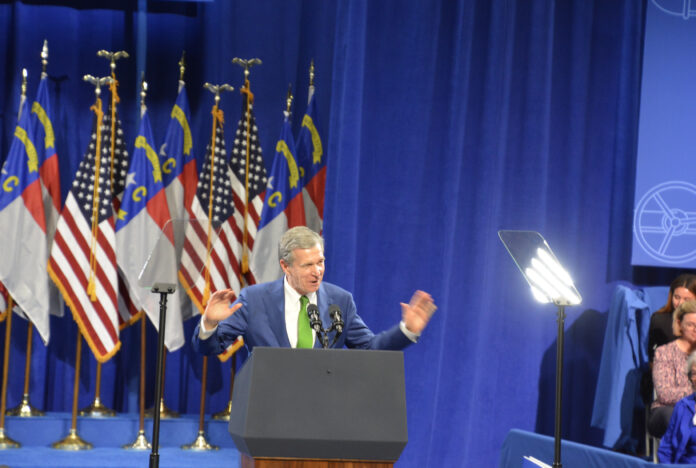NORTH CAROLINA — Billed by the state as a first of its kind, the medical debt relief plan put forth to the U.S. Centers for Medicare and Medicaid Services by Governor Roy Cooper and the North Carolina health department last month has received the go-ahead.
READ MORE: State requests leveraging Medicaid to compel hospitals to relieve medical debt
This will make way for millions of low- and middle-income North Carolinians to be eligible for medical debt relief. CMS approved the state’s Medicaid program to incentivize hospitals to allay billions; hospitals would opt in and follow a list of criteria to receive higher Medicaid payouts.
The governor said in a Monday release, forgiving medical debt will keep people from having ruined credit, facing bankruptcy, not receiving loans or even jobs.
“Unlike most other debts, medical debt is not intentional because people don’t choose to get seriously ill or have an accident,” Cooper said.
It’s a move Vice President Kamala Harris — the presumptive Democratic presidential nominee — praised Monday upon the announcement.
“No one should be denied access to economic opportunity simply because they experienced a medical emergency,” Harris released in a statement. “I applaud North Carolina for setting an example that other states can follow by advancing a plan that has the potential to relieve $4 billion in medical debt for two million individuals and families. This critical step also strengthens financial assistance for emergency medical procedures moving forward.”
According to the Washington Post, Harris worked with Cooper on the “pilot project.”
The governor also has made national headlines in recent weeks for being among the list of potential vice presidential choices on the Harris ticket. Though he has not gone on the record yet expressing interest, multiple news outlets have reported he is among a dozen being vetted. On Monday evening, The New York Times reported Cooper withdrew from consideration.
Alleviating medical debt isn’t new to the Biden-Harris administration, which is on track to forgive $7 billion in medical debt for a few million Americans by 2026 with American Rescue Plan funds. However, Cooper’s plan is a long-term solution.
Medical debt affects roughly 41% of Americans and in North Carolina it accounts for 13.4%. The Tar Heel state is one of six with the most medical debt nationwide and Cooper said last month in a press conference where he announced the plan, hospitals collect only a small fraction of debt owed.
Hospitals that elect to participate in the relief program would have to rid debt for all current enrolled Medicaid patients, dating back a decade to Jan. 1, 2014. According to the state, individuals not enrolled in Medicaid and with incomes less than or equal to 350% of the federal poverty level or if debt exceeds 5% of income also could qualify.
To opt in, hospitals also will need to:
- Provide discounts on medical bills of between 50-100% for patients with incomes at or below 300% FPL, with the amount of the discount varying based on the patient’s income.
- Automatically enroll people into financial assistance, known as charity care, by implementing a policy for presumptively determining individuals eligible for financial assistance through a streamlined screening and income validation approach.
- Not sell any medical debt for consumers with incomes at or below 300% FPL to debt collectors.
- Not report a patient’s debt covered by these policies to a credit reporting agency.
North Carolina Health and Human Services Secretary Kody H. Kinsley explained in the release the plan would provide for the well-being of multiple people while also supporting “financial sustainability of our hospitals.”
NCDHHS will start working with hospitals to implement the program immediately, with the goal to rid debt in the next two years. Patients of participating hospitals will not need to take any actions to benefit.
Port City Daily reached out to Novant Health to find out if NHRMC will participate, as Novant has opted not to work with the Undue Medical Debt in the past. The company will partner with NCDHHS on the debt relief program. The company will support hospitals to identify debt eligibility.
A spokesperson from Novant wrote the company is dedicated to “empowering patients’ financial health alongside their physical and emotional well-being.”
“We look forward to receiving finalized operational details from the North Carolina Department of Health and Human Services so that we can ensure the program requirements do not conflict with separate legal obligations or fall short of our industry-leading financial assistance policies,” he continued.
Hospitals that choose not to implement the policies are still eligible for base Healthcare Access and Stabilization Program (HASP) payments, yet those that participate will receive more of a benefit. HASP — which compensates rural hospitals for about 90% of their unreimbursed Medicaid costs and provide much-needed additional funding — was passed by the General Assembly upon Medicaid expansion in the state last year.
Tips or comments? Email info@localdailymedia.com.
Want to read more from PCD? Subscribe now and then sign up for our newsletter, Wilmington Wire, and get the headlines delivered to your inbox every morning.
